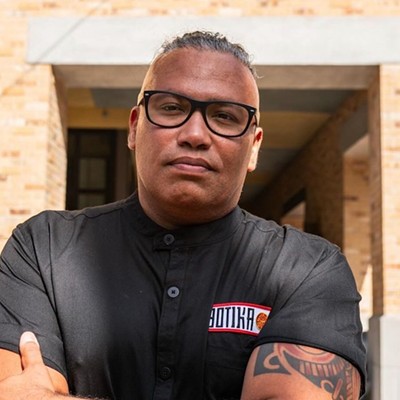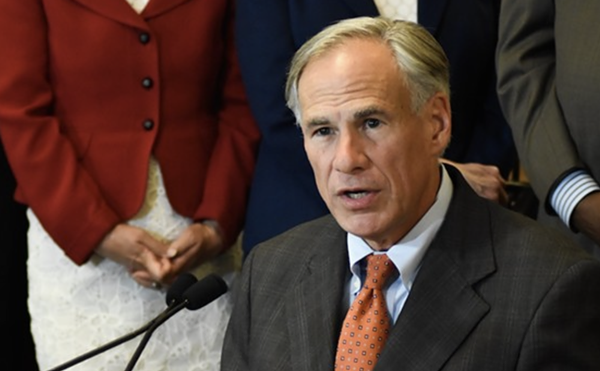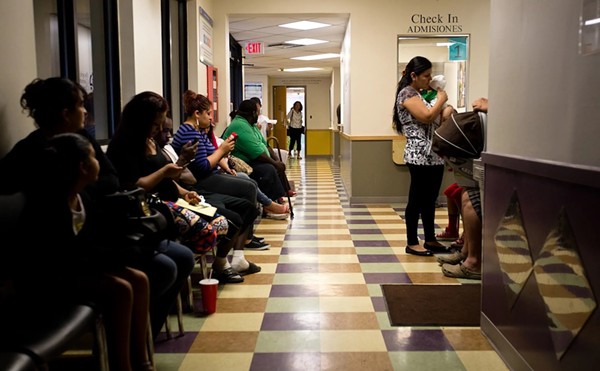Psychotherapist Suzanne Davis Thomas jokes that in the months following the birth of her first child, she and her husband resembled characters in the movie Dumb and Dumber: "He'd say, 'What's wrong with you?' Then I'd say, 'I don't know. What's wrong with me?' Then he'd say, 'I don't know. What's wrong with you?' and on and on." What Thomas did know is that in the midst of life changes - which included giving birth, an isolating move to Bulverde, and leaving her job - something "just wasn't right."
Thomas now believes that what she needed was the kind of assistance she provides at the Postpartum Depression Center of San Antonio. In the months following the Andrea Yates tragedy, interest in what is commonly known as postpartum depression has increased. According to the American Psychiatric Association, about three-quarters of women experience some hormonally induced "baby blues" that subside within days. Between 10 and 20 percent experience a lasting depression after delivery. Only one or two in 1,000 experience postpartum psychosis that reaches the severity seen in Yates.
Thomas knew she wasn't crazy. "Here I am, a counselor with all these resources at my fingertips," she explained, "and this was not an unwanted or unplanned pregnancy. I wanted to be home, but there I was crying all day, every day." After several months without leaving the house, a friend convinced her to make an outing with the baby to a bookstore. That trip ended in a traumatic breast-feeding emergency in front of a roomful of men who were leaving a meeting at the store. For Thomas, it was a breaking point. She fled the store in tears, and drove home, her head spinning. Suddenly she got it: "I told my husband that I figured it out. I just don't want the baby."
Of course Thomas did and does want her daughter, now 2 years old. But such an admission, made during what sufferers might describe as an "endless fog" or with "a head packed with cotton," is the source of much of the shame and confusion that accompanies this disease.
I sat in Thomas' North Side San Antonio office with two women who have "graduated" from her postpartum depression counseling and treatment: 38-year-old Martha Y. Hutchison and 33-year-old Suzanne Francis Dowling. Hutchison emphasized that women suffering from postpartum depression are often generalized. "We're not freaks and we're not going to haul off and hurt our babies. The problem is that it all gets blended together. Either you've got a little 'baby blues' and you'll 'get over it,' or you are just plain crazy."
Depression hit Hutchison about six months after her daughter Juliana was born. In an unpublished letter Hutchison sent to the Express-News after the Yates murders, she wrote of the experience, "I began to feel tired, lost, and in the dark. I was breastfeeding every three hours around the clock. Night turned into day, day into night, weekday to weekend, month to month. One morning I woke up to get Juliana and ran into the wall, which left a bump and bruise on my forehead. When I told the story to friends and family, they laughed - as did I - but inside I cried. I'd walk around like a robot doing what needed to be done. I talked to my husband and mother about the way I was feeling and they both said I'd snap out of it. It continued. Alone I sat in the darkness of Hell with my true gift from God."
Hutchison had saved the piles of pamphlets from her pregnancy, including one on postpartum depression that she almost threw out, but decided to save, she said, "in case someone else might need it." She picked it up and called Thomas. In their first meeting, Hutchison sat hunched with her keys gripped tightly in her hand, weeping. "She had not seen daylight for six weeks. I told her to take a walk. She started planning how to do it with the baby and I said, 'No, take a walk alone, even for five minutes,'" Thomas recalled.
Thomas believes that it is necessary to allow new mothers to do such simple things; many of the women who come to her have an intense fear of being judged. "They bring the baby and it starts to cry and they are ready to run out of there."
Some women are desperate for help. Dowling described how she couldn't "intellectually figure it out."
"Here I think of myself as independent. I'm a traveler. I like to jump out of airplanes. At the same time, I have traditional roots, and I decided that I wanted to leave my job `as a portfolio consultant for the School of Visual Arts in New York City` to be with my child. I planned this. This is what I thought I wanted. I kept saying to myself, 'This is what I want.' All the while I was covering up. I spent weeks just lying on the floor in a room that I baby-proofed, as the baby crawled and played around me. It was all I could do."
Both Dowling and Hutchison were frustrated by the response they received from the medical community. "My doctor recommended a book written about common motherhood 'failures,'" Dowling recalled. "The only word that stuck out in my head was 'failure'. I tried to do all the things they tell you to do. I joined a playgroup, but it left me feeling worse. Everybody else seemed to have it down. I thought I should talk to my mom but when I did, she snapped, 'Don't you hurt that baby.' It is so difficult to explain how one minute you would throw yourself in front of a train for this child and the next minute you want to throw her down the stairs."
Both women said they wonder if the perception that everyone else "has it down" is a mask for the guilt that comes with such depression in what is supposed to be a time of great joy. Hutchison added, "You don't want to talk about the trouble you are having and dampen other people's spirits. But everyone struggles. Now I talk about it. I don't want anyone to go through what I went through."
What she personally endured in seeking help for her own struggle led Thomas to believe that San Antonio lacks resources for postpartum psychological care. "I went knocking on doors of OB-GYN offices asking, 'Why doesn't anybody do this kind of counseling?' The answer was medication, medication, medication, or else I just had total denial. One doctor said, 'I've been in practice 30 years and I've seen no problems.'"
Medication didn't help Dowling. "I had been through the worst of it by the time I got to Suzanne. I had tried anti-depressants and sleeping pills. My brain was confused." According to Dowling, her doctor finally told her, "'You are in crisis. If you do not get to a counselor today, we will put you into a hospital.'" Yet the doctor couldn't suggest a counselor.
Thomas acknowledges that her job is a mixture of clinical social work, counseling training, and a dose of "this is what worked for me." Currently she is the only counselor in San Antonio who focuses exclusively on pregnancy and postpartum issues. When she opened her practice (before the Yates incident), several colleagues criticized her and insisted it would never "make a practice." One advised, "You really ought to do eating disorders. Everyone has those."
Hutchison recalled how, in the depths of the struggle, "you feel like you are just not you." She was part of a support group of women who came to the center for counseling. "We really wanted to see one another," she explained. "It was important to look around and say to yourself, 'she looks kind of normal, kind of like me.'"
Coping with postpartum depression
Dr. Diana Dell, an assistant professor of obstetrics and psychiatry at Duke University has called postpartum depression (PPD) "the most under-recognized, under-diagnosed, and under-treated obstetrical complication in America." In addition to medical specialists, there are many on-line resources for women suffering from post-partum depression.
For Web sites, go to google.com and type the keyword "postpartum."
— chss.iup.edu/postpartum
— geocities.com/Wellesley/4665
— kidshealth.org/parent/pregnancy_newborn/pregnancy/ppd_baby.html
— postpartumstress.com
— sbpep.org
— thelaboroflove.com/forum/karena

















